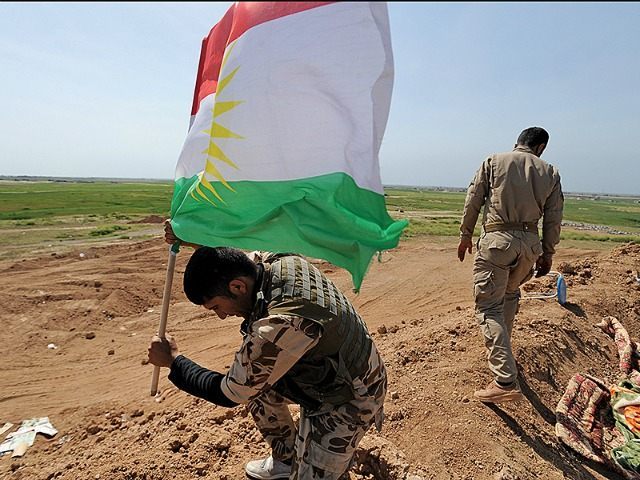The autonomous Kurdish Regional Government (KRG) in northern Iraq is officially calling for the establishment of its own state in the region.
Citing the Philadelphia Media Network [Philly], an American news outlet, Rudaw paraphrases KRG President Masoud Barzani as indicating that “the time has come for the world leaders to rethink the boundaries of the Middle East and for the Kurds to have a state of their own in the region.”
The Iraqi Kurdistan president predicted that a Kurdish state will be established in the northern Iraqi region sooner or later.
“As for the Kurds, they have been dreaming of independence since the 1923 Lausanne Treaty between the World War I allies and post-Ottoman Turkey,” Barzani explained. “That document reneged on a promise to carve a Kurdish state out of the remains of the Ottoman Empire and allow this non-Arab ethnic group to have its own home.”
On March 10, the Kurdish leader reportedly “told a meeting of his Kurdistan Democratic Party party members that the Kurds will only spill their blood for an independent Kurdish state in the future,” notes Rudaw.
“If we spill blood this time, it is only for independence, we must make it come true and all the blood that we have spilled so far will not be wasted,” he stressed.
“Independence is our right and we have worked for it and we will never give it up,” later vowed Barzani.
The KRG leader told Kurdish political parties early this year that a referendum on Kurdish independence was long overdue, adding that it should have taken place before the U.S. presidential election in November.
An independent Kurdish state is going to bring about much needed stability to the Middle East, assured Barzani.
Adhering to the One Iraq Policy, the United States has neither endorsed nor supported an independent Iraqi Kurdish state.
“If the U.S. will not be against us, will not oppose it, we will be very grateful,” proclaimed Barzani.
During the speech, he also “discussed a variety of issues currently affecting the region including the reasons behind the emergence of terrorists groups like the Islamic State [ISIS/ISIL], the failure of Iraq and Syria nation states and the potential for Kurdish statehood.”
“If you look at the Middle East, the old borders only exist on paper,” he declared. “There has already been a redrawing of the Middle East,” prompted by the “new realities on the ground.”
Iraq was fragmented when ISIS seized large swathes of Iraq in the summer of 2014, argued Barzani.
“This was also the case in Syria, Barzani added, because ‘the regime’s brutal response to a peaceful uprising has torn the country apart, largely along sectarian lines.’ Therefore, he reasoned, ‘I think it will be very difficult to have a united Syria again,’” according to Rudaw.
“It was the sectarian conflict which ‘opened the way for ISIS to base itself in Sunni areas on both sides of the Syria-Iraq border,’ Barzani said before adding that ‘killing will continue’ given the diverse ethno-sectarian make-up of the Iraqi and Syrian states,” adds the report.

COMMENTS
Please let us know if you're having issues with commenting.